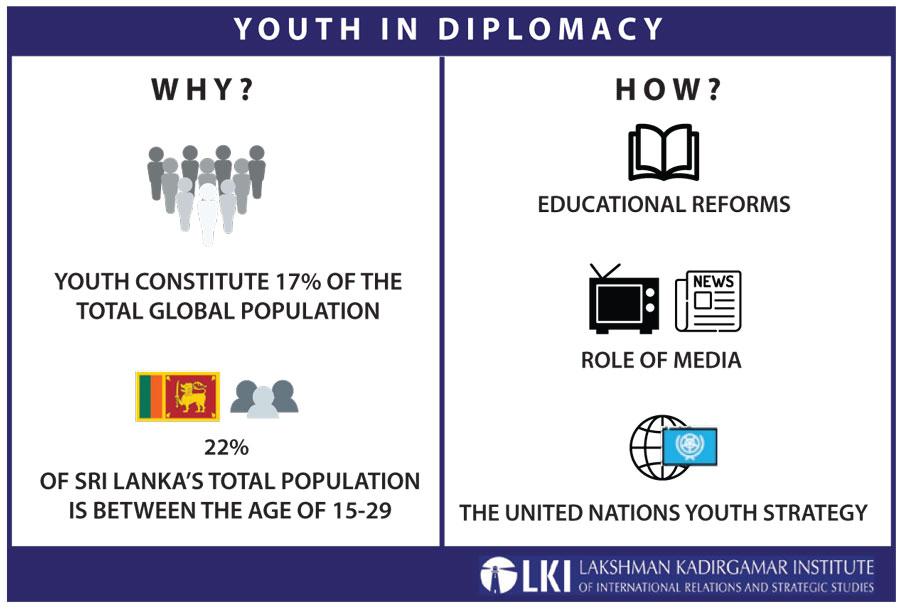Reply To:
Name - Reply Comment
Last Updated : 2024-04-23 22:35:00

 Youth constitute 16 percent of the world’s population and these numbers are projected to increase to 17 percent by 2030. In addition, young people today are connected to each other like never before and are a core demographic in the using and building of disruptive new technologies, global social and clean energy networks.
Youth constitute 16 percent of the world’s population and these numbers are projected to increase to 17 percent by 2030. In addition, young people today are connected to each other like never before and are a core demographic in the using and building of disruptive new technologies, global social and clean energy networks.
However, youth have very little voice in development programmes, peace negotiations and most international and domestic political decision-making, despite their growing demographic and economic significance. It is, therefore, imperative that youth are given the opportunity to engage with international institutions and initiatives and contribute their ideas to resolve global issues.
It’s evident that if youth step up to mobilise their nation’s potential to move forward in the right direction, they can create a significant impact on the nation’s transformation in the international arena.
Youth aged 15 to 29 constitute 22 percent of Sri Lanka’s total population and it is high time the Sri Lankan youth are allowed to share their opinions and ideas on policymaking and foreign diplomacy, as the former and current generations of leaders—with very few exceptions—have proven themselves incapable of ‘walking the talk’.
The trauma of a civil war that spanned almost three decades has left its scars on society. Youth from war-affected regions are left disillusioned by the lack of inclusion in most international and domestic development programmes that make decisions on their behalf. A closer examination of the recent surge of ethnic conflicts notes that youth were involved in instigating some of these events.
The scope for youth in international engagement is vast, diverse and untapped. Sri Lanka should consider its past and the looming issues of youth-led extremism and violence as an opportunity to take a more proactive role in countering youth issues by setting up a platform that enables youth engagement in diplomacy and international affairs.
It is necessary to facilitate the younger generations with appropriate skills required to excel in the field of international relations. Investing in these young agents of change definitely offers the potential of a tremendous multiplier effect. Sri Lankan youth-led organisations played a pivotal role in tsunami assistance and relief processes during several natural disasters. Therefore, providing younger generations the opportunity to pioneer and implement diplomatic and economic initiatives should be a long-term vision, as the future development and longevity of a nation is ultimately in the hands of youth. They would possess more responsibility for the decisions and initiatives they present as it directly reflects on their own future.
Role of education
A key policy measure required in facilitating youth engagement is educational reform. However, the progress on this front has not been promising, particularly in the developing world. In Sri Lanka, the secondary school curriculum does not adequately cover international politics and diplomacy, leaving youth – notably those from rural areas – unaware of the significance of foreign relations and the international community in determining Sri Lanka’s prosperity and political stability. Such issues are further compounded by the lack of facilities to accommodate all students that qualify for tertiary education, leading to only 9 percent of all eligible students being admitted to universities.
The lack of English language skills is another key factor that discourages youth involvement in foreign affairs. Only 10 percent of secondary students master spoken English, while only one percent of students exhibit the required competency in written English. These skills are furthermore restricted to Colombo and other urban areas, while excluding the rural youth due to lack of awareness, exposure, proper guidance and mentoring.
Therefore, much needs to be done on this front before the Sri Lankan youth are adequately prepared as a whole to engage proactively and confidently with issues of foreign policy. One such area that requires attention would be the ‘International Youth Relations’ division of the Youth Parliament.
At present, the Youth Parliament does not cover international relations and diplomatic ties in a deeper sense. Expanding the International Youth Relations division’s activities beyond mere youth exchange programmes would make their contribution towards the nation’s development more productive and efficient.
Role of media
Media, both social and mainstream, has the potential to inspire, given its considerable influence on society and plays a critical role in keeping youth informed on global issues in an effective manner.
However, the question remains – has the role of media been more active in manipulating youth rather than moulding them in the right manner? As social media is often used for propaganda and mainstream media is influenced by political motives, it is much easier to instigate than inspire.
Youth radicalization and exploitation does not stop at borders. Social media and other modern means of communication have enabled terrorist groups and individuals to promote their extremist ideologies amongst youth across the globe with ease.
Now more than ever, the media has a high level of responsibility to maintain the integrity of information disseminated to keep youth informed about the necessity of their engagement in effective diplomacy, while ensuring that they are not influenced by exposure to extremist ideologies.
UN Youth Strategy
The United Nations Youth Strategy is the first attempt at a framework to guide the international community with regard to youth involvement and reaffirms the UN’s message that young people are “an essential asset worth investing in”.
The strategy incorporates the role of youth into the global sustainability agenda via three key pillars: peace and security, human rights and sustainable development. At its core, the strategy aims to provide a blueprint for joint initiatives and implementation of effective practices before it is too late.
It also outlines the unique position of the UN to challenge and support states to ensure protection and support for young people and provides a platform through which their “needs can be addressed, their voice can be amplified and their engagement can be advanced”.
States could further realise the goals articulated in the UN Youth Strategy by creating networks to educate and involve youth in activities related to global trade, diplomacy, sustainability and peace-building. Indonesia, for example, has established Indonesian Youth Diplomacy, a youth-run, youth-led programme that raises awareness and builds capacity among Indonesians.
Meanwhile, in Sri Lanka, platforms like the Sri Lanka Model United Nations (SLMUN) provide youth an opportunity to learn the art of diplomacy and conflict resolution. SLMUN is additionally committed to expanding its role through the Vision 2020 programme.
Conclusion
It is crucial that successful initiatives receive both financial and political support. Furthermore, much remains to be done in areas such as educational reforms.
However, these are post facto initiatives that address the existing issues. The more challenging goal will be enacting long-term policy reforms that empower youth and provide them with skill sets to confidently navigate the world of international politics, before negative consequences of lack of youth engagement in diplomacy manifest around the world.
(Shihan Maharoof is a Research Assistant at the Lakshman Kadirgamar Institute of International Relations and Strategic Studies (LKI). The opinions expressed in this article are the author’s own and not the institutional views of the LKI or do they necessarily reflect the position of any other institution or individual the author is affiliated with)
m.shaahid Tuesday, 02 April 2019 07:39 PM
well said.I can see some real energy from the writer.keep it up

Add comment
Comments will be edited (grammar, spelling and slang) and authorized at the discretion of Daily Mirror online. The website also has the right not to publish selected comments.
Reply To:
Name - Reply Comment
On March 26, a couple arriving from Thailand was arrested with 88 live animal
According to villagers from Naula-Moragolla out of 105 families 80 can afford
Is the situation in Sri Lanka so grim that locals harbour hope that they coul
A recent post on social media revealed that three purple-faced langurs near t